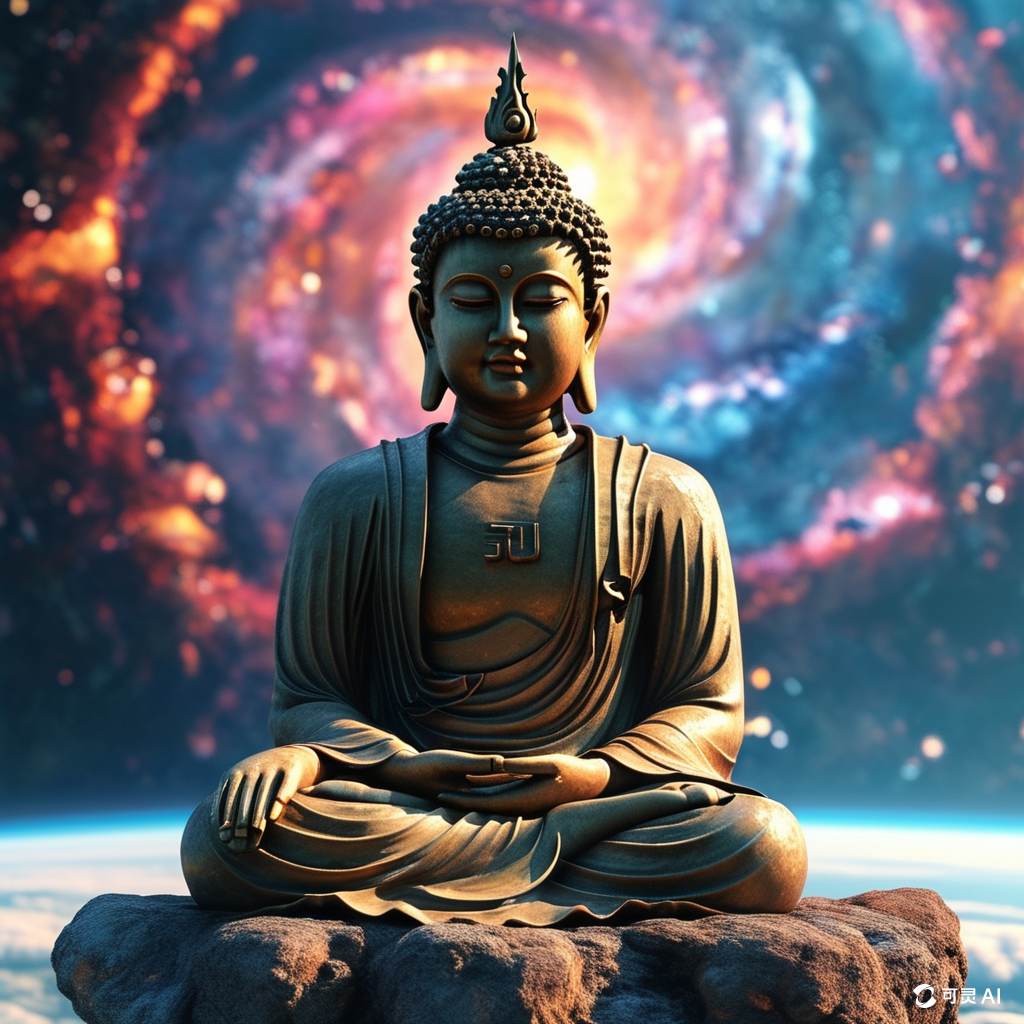禅意与逻辑:佛学是如何构建严密理论体系的?
1 comment

这段时间,我在阅读和佛学相关的书籍,也和AI进行了一些探讨。为什么会突然间对佛学感兴趣呢?
虽然我们的生活中,汉语中有很多来自佛教的词语,比如“报应”、“阿弥陀佛”,还有武汉方言中非常常用的表达“可怜”,“生活窘迫”,通常会说“造业”。这都是标准的佛教用语。
一点题外话,其实,虽然现在提倡说普通话,我们的下一代也基本上不会说武汉话了,但在方言中大家说的一些俗语,虽然在武汉话中,大家经常说的俗语都是很有典雅的出处。
另一个例子就是,武汉人在好勇斗狠的时候会说,“你不服周吗?” 这其实体现了楚国人对周天子以及周王室的轻蔑态度。
接着说回来,这些语言文化上的现象可以看出,佛教对中国人的影响是非常深的。虽然在中国传播发展了2000多年,它在很大程度上也是中国化了。但百姓对宗教的需求,无非就是求一个心理安慰和神佛保佑。真正专业理解佛学的却不是很多。
这段时间读了那本《佛祖说了什么》等通俗介绍佛学的书之后,对佛学有了些许粗浅的了解。发现佛学与其说是一门宗教,不如说是一门哲学,甚至是有些偏科学的哲学。
因为和其他的宗教不同,佛教的理论是建构在严密的逻辑推理之上,而不是建构在神话和历史故事之上。逻辑推理最好的例子就是欧几里德的几何学。先确定四条公理,然后通过逻辑推理建构出整个平面几何的大厦。
还有经济学中的奥地利学派经济学也是通过人的行动是有目的的这条公理推演出了商业周期理论,并得出市场经济是人人之间协作协调资源最有效的方式。
如果你去查看科学史,那些真正改变人们思想的重大科学发现,并不全是通过观察和总结现实世界中的现象得出的,而是通过科学家们的逻辑推理。比如广义相对论,它没有建立在任何的观察和实验结果之上,完全是爱因斯坦在自己的大脑中做思想实验和逻辑推理建构出来的。至今仍是人类所掌握的描述这个宇宙最精确的物理理论之一。
但是和这些现代的理论比起来,两千年历史的佛学,如果认真钻研一下,给人们思想带来的震撼还要大得多。通过这么长时间无数法师的专业研究和积累,佛学理论的逻辑推理链条已经相当长,甚至得出了与现代科学理论几乎一模一样的结论。而这些也只是佛学大师们在头脑中构建出来的。
昨天和我的Gemini AI讨论了佛学中观学,它的观点特色就是破除了时间和空间的存在。万物本源就是空。所谓“法无自性”,也就是万事万物都是由其他的因缘促成,但是这个因缘的链条不可能无限的推导下去。所以最后必然有一个根本就是空,什么都没有,自然也就不会由其他的事物产生。这就得出了万物性空的观点。万物性空,就和量子力学的观点非常相似。所有的基本粒子,也不是存在的组成,就像是组成做的砖块一样,它们是从真空中展落出来的。粒子与正电子可以相互湮灭消失,光子又可以激发电子场,产生正负电子对。
我们人类所看到的各种实实在在的事物,实际上都是假有,都不是恒常的,包括时间与空间。在爱因斯坦的相对论当中,时间和空间已经不是绝对的了,而是相对的。观察者的运动状态不同,时间和空间的流逝也会有所不同。如果一个东西是实在的,为什么会这样变化呢?在相对论当中,时间和空间可以变化,但却有一样东西是不能变化的,那就是因果关系。要达到这一点,必须将光速设为宇宙中运动速度的上限。而这正是佛教所讲,博学所强调的观点,世间没有恒常不变的东西,只有因果在不断的轮回。
说这些只是想表达一下,如果以封建迷信的滤镜,认为佛学佛教就是求神拜佛,祈求保佑,真的是眼界太狭隘了。

During this time, I was reading books related to Buddhism, and I also had some discussions with AI. Why the sudden interest in Buddhism?
Although in our lives, Chinese has many words from Buddhism, such as "retribution", "Amitabha Buddha", and the Wuhan dialect is very common expressions "pity", "living in distress", usually say "making karma". It's all standard Buddhist language.
As an aside, in fact, although Putonghua is now advocated, our next generation will basically not be able to speak Wuhan dialect, but some of the common sayings that people say in dialects, although in Wuhan dialect, people often say the common sayings are very elegant sources.
Another example is that Wuhan people will say when they are brave and ruthless, "Are you not willing to accept Zhou?" This actually reflects the Chu people's contemptuous attitude towards the Zhou Emperor and the Zhou royal family.
Then again, these linguistic and cultural phenomena can be seen that Buddhism has a very deep influence on the Chinese people. Although it has developed in China for more than 2,000 years, it has also been largely Sinicized. But the people's need for religion is nothing more than a psychological comfort and the blessing of God and Buddha. Not many people really understand Buddhism professionally.
During this period of time, after reading the book "What the Buddha said" and other popular books introducing Buddhism, I have a slight understanding of Buddhism. It is found that Buddhism is not so much a religion as a philosophy, even a somewhat scientific philosophy.
Because unlike other religions, Buddhist theories are based on rigorous logical reasoning rather than myths and historical stories. The best example of logical reasoning is Euclid's geometry. First determine four axioms, and then through logical reasoning to construct the whole plane geometric edifice.
The Austrian school of economics also derived the business cycle theory from the axiom that human actions have a purpose, and concluded that the market economy is the most efficient way for people to cooperate and coordinate resources.
If you look at the history of science, the great scientific discoveries that really changed people's minds were not all made by observing and summarizing phenomena in the real world, but by logical reasoning of scientists. The theory of general relativity, for example, is not based on any observations or experiments, but on thought experiments and logical reasoning in Einstein's own brain. It is still one of the most accurate physical theories of the universe that we have at our disposal.
But compared with these modern theories, Buddhism with a history of two thousand years, if carefully studied, will bring much greater shock to people's minds. Through the professional research and accumulation of countless masters over such a long period of time, the logical reasoning chain of Buddhist theory has been quite long, and even reached almost the same conclusion as modern scientific theory. And these are only constructed in the minds of Buddhist masters.
Yesterday I was talking to my Gemini AI about Buddhist Meditama, which is characterized by its elimination of the existence of time and space. The origin of all things is emptiness. The so-called "Fa has no self-nature", that is, everything is caused by other causes, but this chain of causes cannot be derived indefinitely. Therefore, in the end, there must be a fundamental emptiness, there is nothing, and nature cannot be produced by other things. This leads to the view that all things are empty. Everything is empty, which is very similar to the idea of quantum mechanics. All the elementary particles, too, are not components of existence, just like the bricks they are made of, they fall out of the vacuum. Particles and positrons can annihilate each other and disappear, and photons can excite electron fields to produce positron and positron pairs.
All kinds of real things that we humans see are in fact false and not permanent, including time and space. In Einstein's theory of relativity, space and time are no longer absolute, but relative. The passage of time and space varies depending on the observer's state of motion. If something is real, why does it change this way? In relativity, time and space can change, but there is one thing that cannot change, and that is cause and effect. To achieve this, the speed of light must be set as the upper limit for the speed of motion in the universe. And this is exactly the point of view that Buddhism says and erudite emphasizes, there is no constant thing in the world, only cause and effect in the continuous reincarnation.
I just want to express that if we use the filter of feudal superstition to think that Buddhism is to pray to God and pray for blessings, our vision is really too narrow.
Comments